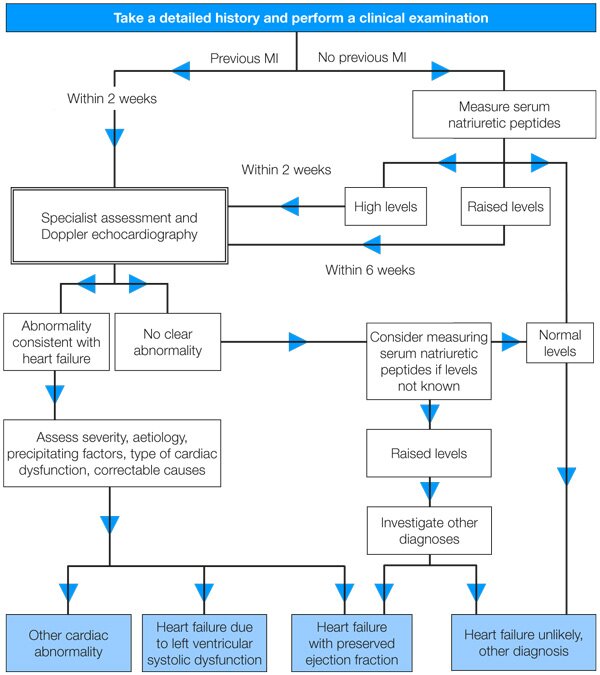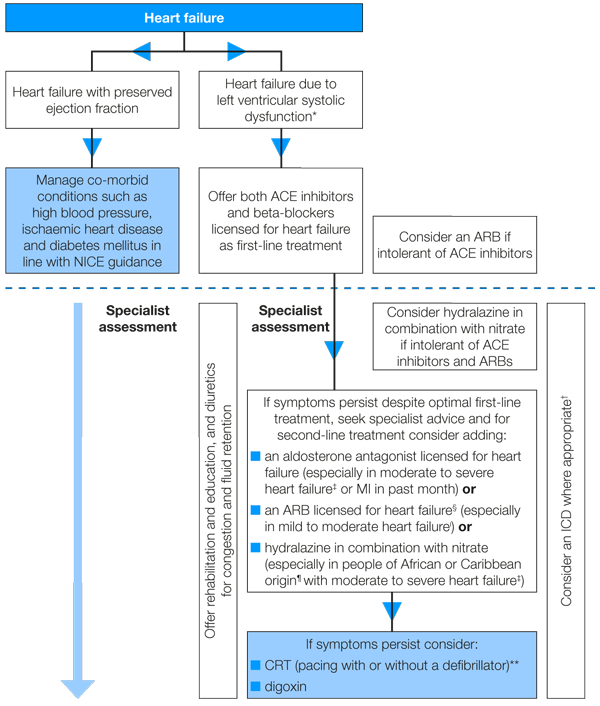- You are here:
- Home
- >
- Guidelines summaries
- >
- Cardiovascular
Chronic heart failure: management of chronic heart failure in adults in primary and secondary care
National Institute for Health and Care Excellence
Diagnosing heart failure

Serum natriuretic peptides
High levels—BNP>400 pg/ml (116 pmol/litre) or NTproBNP>2000 pg/ml (236 pmol/litre) Raised levels—BNP 100–400 pg/ml (29–116 pmol/litre) or NTproBNP 400–2000 pg/ml (47–236 pmol/litre) Normal levels—BNP<100 pg/ml (29 pmol/litre) or NTproBNP<400 pg/ml (47 pmol/litre)
Chronic heart failure: management of chronic heart failure in adults in primary and secondary care continued
Treating heart failure

ACE=angiotensin-converting enzyme; ARB=angiotensin II receptor blockers; ICD=implantable cardioverter defibrillator; CRT=cardiac resynchronization therapy.
* For more information on drug treatment see appendix D of the NICE guideline and 'Chronic kidney disease' (NICE clinical guideline 73). †Consider an ICD in line with 'Implantable cardiovascular defibrillators for arrhythmias' (NICE technology appraisal guidance 95). ‡NYHA class III–IV. §Not all ARBs are licensed for use in heart failure in combination with ACE inhibitors. |NYHA class II–III. ¶This does not include mixed race. For more information see the full guideline at www.nice.org.uk/guidance/CG108. **Consider CRT in line with 'Cardiac resynchronisation therapy for the treatment of heart failure' (NICE technology appraisal guidance 120).
Lifestyle advice for patients with heart failure
- Exercise
- see ‘Rehabilitation’ below
- Smoking
- strongly advise patients not to smoke
- consider referral to smoking cessation services
- Alcohol
- advise patients with alcohol-related heart failure to abstain
- discuss consumption with other patients and tailor advice to clinical circumstances
- Sexual activity
- be prepared to broach sensitive issues such as sexual activity
- Vaccination
- offer:
- an annual vaccination against influenza
- a one-off vaccination against
pneumococcal disease
- offer:
- Air travel
- consider clinical circumstances when advising about air travel
- Driving regulations
- check the latest Driver and Vehicle Licensing Agency guidelines for drivers of large goods and passenger carrying vehicles (see www.dft.gov.uk/dvla for regular updates)
Chronic heart failure: management of chronic heart failure in adults in primary and secondary care continued
Monitoring
Clinical review
- Monitor all patients. Include:
- clinical assessment of functional capacity, fluid status, cardiac rhythm (minimum of examining the pulse), cognitive status and nutritional status
- a review of drug treatment, including need for changes and possible side effects
- a minimum of serum urea, electrolytes, creatinine and eGFR*
- When a patient is admitted to hospital because of heart failure, seek advice on their management plan from a specialist in heart failure
Rehabilitation
- Offer a supervised group exercise-based rehabilitation programme designed for patients with heart failure
- ensure the patient is stable and does not have a condition (such as uncontrolled ventricular response to atrial fibrillation, or uncontrolled hypertension) or device (for example, a high-energy pacing device set to be activated at rates achieved during exercise) that would preclude the programme
- include a psychological and educational component in the programme
- the programme may be incorporated within an existing cardiac rehabilitation programme
Discharge planning and long-term care
Discharge planning
- Discharge patients from hospital only when their condition is stable and their management plan optimised. When considering the timing of discharge take account of:
- patient and carer wishes
- level of care and support available in the community
* This is a minimum. Patients with comorbidities or co-prescribed medications will require further monitoring. Monitoring serum potassium is particularly important if a patient is taking digoxin or an aldosterone antagonist
full guideline available from…
National Institute for Health and Care Excellence, Level 1A, City Tower, Piccadilly Plaza, Manchester, M1 4BT
guidance.nice.org.uk/CG108
National Institute for Health and Care Excellence. management of chronic heart failure in adults in primary and secondary care. August 2010
- Continue reading:
- 1
- 2
- 3
- Next →
Please to rate this article, view others comments or make your own.

eGuidelines.co.uk (30 June 2013)
© 2013
First included: Oct 03.
disclaimer |



